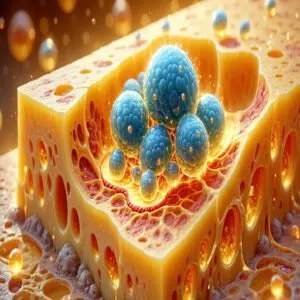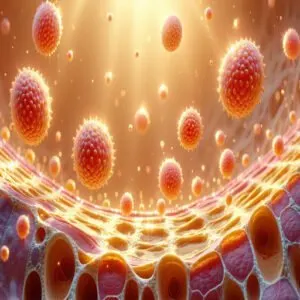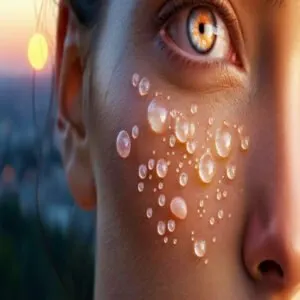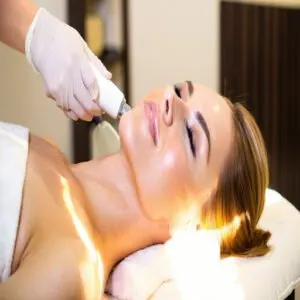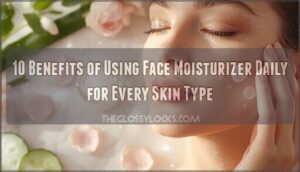This site is supported by our readers. We may earn a commission, at no cost to you, if you purchase through links.

Your skin’s natural process of shedding old cells and creating new ones slows with age, but simple steps can help.
Regular exfoliation clears away dead skin, letting fresh cells shine through.
A balanced diet packed with vitamins, minerals, and healthy fats fuels collagen production and repair.
Don’t skip sunscreen—UV rays can sabotage your efforts.
For advanced options, treatments like chemical peels, microneedling, or laser resurfacing stimulate cell turnover and collagen growth.
It’s like giving your skin a workout!
Smart choices today mean healthier, glowing skin tomorrow—ready to explore your options?
Table Of Contents
- Key Takeaways
- Skin Regeneration Process
- Factors Affecting Skin Renewal
- Skin Resurfacing Treatments
- Effective Skin Renewal Strategies
- Advanced Skin Renewal Techniques
- Frequently Asked Questions (FAQs)
- How do you promote skin renewal?
- What are the ways to improve skin glow?
- Why is Skin Renewal important?
- Which ingredients are effective for promoting skin renewal?
- What is skin cell renewal?
- How can I support my skin’s natural cell renewal process?
- Who Should Perform Skin Resurfacing Treatments?
- How can I speed up my skin renewal?
- What is the best rejuvenation for aging skin?
- What is the best way to revitalize your skin?
- Conclusion
Key Takeaways
- Exfoliate regularly to remove dead skin cells and speed up cell turnover for a fresh, glowing complexion.
- Protect your skin daily with sunscreen to prevent UV damage, premature aging, and collagen breakdown.
- Fuel your skin’s renewal with a nutrient-rich diet including vitamins C and A, omega-3s, and hydration.
- Consider advanced treatments like microneedling or chemical peels to boost collagen and improve skin texture.
Skin Regeneration Process
Your skin’s regeneration process is like a well-oiled machine, working to replace damaged cells with fresh, healthy ones.
As you age, this natural cycle slows down, making it essential to support your skin with proper care and nourishment.
Epidermal Stem Cells Role
Epidermal stem cells are the skin’s hidden repair crew, constantly working to keep your epidermis renewed and fresh.
These cells drive cell regeneration by dividing and producing new ones, replacing old or damaged layers, and are essential for tissue engineering, epidermal repair, and maintaining healthy skin cell turnover.
That’s real skin renewal.
Cell Division and Migration
Your skin’s renewal kicks off with the mitosis process, where cells divide, setting the stage for dynamic tissue repair.
These newly born skin cells rely on cell signaling to migrate upward, contributing to epidermal growth and collagen production.
Cellular movement is like a synchronized dance, ensuring skin cell turnover stays on track, which is the foundation of skin regeneration and repair.
Cell Maturation and Desquamation
Your skin’s glow relies on the keratinization process and cell signaling.
New skin cells mature as they travel upward, forming a strong barrier.
Desquamation, the final step, sheds dead cells to make way for fresh ones.
Regular exfoliation supports this natural cell turnover, speeding skin renewal and tissue repair.
Keep that cycle humming for ideal skin regeneration!
Impact of Age on Skin Regeneration
As cells mature and shed, aging takes the spotlight.
Aging skin faces a regeneration slowdown—cell turnover slows, and collagen production dips.
This cellular decline means dullness, reduced skin elasticity, and thicker, less vibrant skin.
By age 50, skin renewal drags to 84 days.
For more details, explore this guide to skin regeneration.
Supporting collagen loss through hydration, a healthy lifestyle, and proper care keeps aging skin looking fresh, which involves understanding the process of skin regeneration.
Factors Affecting Skin Renewal
Your skin’s renewal process depends on more than just age—it’s influenced by your lifestyle, diet, and environment.
Healthy habits and smart choices can keep your skin working its best, even as natural processes slow down over time, which is impacted by your overall lifestyle.
Lifestyle Choices and Skin Health
Your daily habits directly shape your skin’s glow.
Stress management and mental wellness aren’t just buzzwords—they’re a lifeline for skin health.
Regular exercise improves circulation, fueling healthy habits like a nutrient-dense diet.
Sleep resets everything, and hydration keeps skin plump.
Nail these lifestyle choices, and your skin might just thank you with a natural, balanced radiance.
Understanding the importance of healthy skin habits is vital for maintaining a consistent skincare routine that yields superior results.
Nutritional Support for Skin Regeneration
A nutrient-dense diet powers skin regeneration and boosts collagen production.
Add these to your plate:
- Vitamin C: Citrus fruits and bell peppers fuel collagen and renewal.
- Omega fatty acids: Salmon and walnuts keep skin hydrated and elastic.
- Vitamin A: Carrots and spinach protect from sun damage.
- Antioxidant Role: Green tea defends against damage.
- Minerals: Zinc fights deficiency and aids repair.
Avocados can improve skin elasticity according to this helpful nutrition guide.
Environmental Factors and Skin Aging
Environmental factors like UV rays and air pollution accelerate skin aging, leaving you with fine lines and dullness.
Climate change, with fluctuating weather, and poor water quality can worsen things, while toxic exposure from chemicals further damages the skin barrier.
Using an anti aging cream can be part of a skincare routine to combat these effects.
Here’s a quick comparison:
| Factor | Effect on Skin |
|---|---|
| UV Rays | Wrinkles, dark spots |
| Air Pollution | Dullness, breakouts |
| Climate Change | Increased dryness |
| Water Quality | Irritation, breakouts |
| Toxic Exposure | Barrier damage |
Importance of Hydration and Sleep
Skipping sunscreen and poor habits age your skin, but ignoring hydration and sleep can be equally damaging.
Drinking enough water supports skin elasticity and flushes toxins.
Prioritize healthy sleep patterns for better cellular health.
- Drink water to boost skin hydration.
- Sleep 7–9 hours for skin renewal.
- Avoid sugary drinks.
- Use humidifiers for hydration benefits.
- Skip late-night scrolling—it shows on your face!
Skin Resurfacing Treatments
If you’re looking to refresh your skin and tackle issues like fine lines, discoloration, or dullness, skin resurfacing treatments offer proven results.
From lasers to chemical peels and microneedling, these techniques work by smoothing skin texture and promoting healthy cell turnover.
Laser Skin Resurfacing Benefits
Thinking about hitting refresh on your skin’s glow?
Laser skin resurfacing is your shortcut to smoother, younger-looking skin.
It’s quick, lasts 30–45 minutes, and ramps up collagen stimulation for noticeable improvement.
From wrinkle reduction to skin renewal, here’s how it stacks up:
| Benefit | Duration | Targets |
|---|---|---|
| Wrinkle Reduction | Permanent | Fine lines |
| Facial Contouring | Immediate | Skin texture |
| Skin Rejuvenation | Visible daily | Discoloration |
| Effective Skin Renewal | Weeks | Acne scars |
| Laser Safety | High levels | All skin types |
The benefits of laser skin resurfacing include permanent results for certain conditions, making it a valuable option for those seeking younger-looking skin.
Chemical Peels for Skin Renewal
While laser treatments work wonders, chemical peels offer a simpler way to refresh your skin.
These peel solutions remove dead skin cells, encourage skin regeneration, and reveal a brighter, plumper layer underneath.
From light skin exfoliants to deeper chemical applications, peel benefits range from improved texture to antiaging skincare support.
Understanding chemical peel solutions is essential for effective skin renewal.
Choose wisely to prevent overdoing it and promote healthy skin renewal.
Microneedling for Skin Rejuvenation
Microneedling gives your skin a collagen boost by creating tiny, controlled punctures.
This sparks skin regeneration, improving texture, tone, and facial contours.
It’s ideal for treating acne scars, fine lines, and stretch marks.
With minimal downtime and effective results, microneedling benefits include brighter, smoother skin.
Pair it with serums for enhanced skin renewal and watch collagen production work wonders!
IPL for Pigmentation Issues
Imagine erasing years of sun damage and discoloration—IPL, or intense pulsed light, makes it possible.
This non-invasive hyperpigmentation treatment uses targeted light pulses for pigment removal, skin brightening, and photo rejuvenation.
Whether it’s melasma, freckles, or sun spots, IPL improves skin pigmentation in as little as three sessions.
Just avoid tanning and follow post-procedure care for glowing results!
Effective Skin Renewal Strategies
You can boost your skin’s renewal process by focusing on a few key strategies that are simple and science-backed.
From regular exfoliation to using sunscreen daily, these steps help maintain healthy, glowing skin as you age.
Exfoliation for Cellular Turnover
A little exfoliation goes a long way for cellular renewal.
By gently scrubbing away dead skin, you help reveal fresher cells underneath and speed up cell turnover.
Skin exfoliants, like alpha-hydroxy acids or a facial peeling mask, can spark collagen production and skin regeneration.
Stick to gentle methods to avoid irritation—your glow will thank you!
To achieve the best results, understanding sensitive skin care is essential for a personalized skincare routine.
Sun Protection for Skin Preservation
Exfoliating’s great, but sun protection keeps that fresh layer thriving.
UV rays don’t just burn; they wreck collagen and speed up aging like a bad habit.
Stick to a daily sunscreen routine with ingredients like zinc oxide or avobenzone for full coverage.
Bonus: it’s skin cancer prevention, too.
Pair hats and shade with sunscreen—your skin’s long-term health will thank you.
Choosing Skincare Products Wisely
You’ve nailed sun protection, but what about picking the right skin care products for skin renewal?
Focus on these steps:
- Check Product Labeling: Look for clear ingredient lists and expiration dates.
- Match Skin Typing: Oily, dry, or combination? Choose accordingly.
- Test Product Texture: Lightweight or rich—go with what feels right.
- Avoid Synthetic Fragrances: They can irritate sensitive skin.
Understanding skin care products is essential for effective skin renewal.
Consistency matters in creating your skin care routine.
Nutritional Support for Healthy Skin
Got your skincare products sorted?
Great! Now, let’s talk food.
A nutrient-dense diet isn’t just a buzzword—it’s your skin’s best friend.
Vitamins, minerals, and healthy fats fuel collagen production and repair.
Check this cheat sheet of must-haves:
| Vitamin | Benefits | Sources |
|---|---|---|
| Vitamin C | Collagen production | Citrus, bell peppers |
| Vitamin E | Antioxidant role | Nuts, spinach |
| Omega-3 | Skin hydration | Salmon, chia seeds |
| Zinc | Wound healing | Oysters, pumpkin seeds |
| Healthy Fats | Cell repair | Avocado, olive oil |
Skin thrives on what’s in your kitchen as much as what’s in your cabinet!
Advanced Skin Renewal Techniques
If you’re ready to take your skin renewal routine to the next level, advanced treatments like ultrasonic tightening, neuromodulators, and fillers offer impressive results.
These techniques work by targeting deeper skin layers to improve tone, reduce wrinkles, and restore youthful contours with minimal downtime, utilizing ultrasonic tightening.
Ultrasonic Skin Tightening
Looking for a non-invasive way to boost skin renewal and contour your face?
Ultrasonic skin tightening is a game-changer, using sound waves to lift and rejuvenate.
- Facial contouring without surgery
- Stimulates collagen for smoother skin
- Targets deep layers for firming
- Safe, painless, with no downtime
- Results improve over months
This technique truly transforms sagging into stunning!
Neuromodulators for Dynamic Lines
While ultrasonic tightening lifts and firms, neuromodulators like Botox step in to calm overactive facial muscles.
By softening the repetitive movements behind dynamic wrinkles—think crow’s feet or frown lines—neuromodulator injections bring smoother skin and natural facial expressions.
Quick, nearly painless, and effective for wrinkle prevention, it’s a go-to for freshening up your look without skipping a beat.
Hyaluronic Acid Fillers for Rejuvenation
How do hyaluronic acid fillers work wonders for skin rejuvenation? These dermal fillers restore facial volume, smooth wrinkles, and redefine facial contours without invasive surgery.
By attracting water molecules, they hydrate and tighten skin, promoting renewal.
- Boost Facial Volume for a youthful look.
- Achieve Wrinkle Reduction effortlessly.
- Enhance Facial Contours with precision.
- Hydrate Skin Naturally by retaining moisture.
- Ensure Filler Safety with expert application.
Post-Procedure Care for Optimal Results
Healing after treatments can feel tricky, but good aftercare makes it easier.
Focus on wound healing and hydration. Use a barrier cream, stay out of the sun, and cleanse gently. Skip retinol for 48 hours.
Curious about what’s safe? Check this quick guide: Understanding skin care routine is essential for maintaining healthy skin.
| Do | Don’t | Why |
|---|---|---|
| Use Vaseline | Avoid exfoliants | Prevents irritation |
| Apply mineral sunscreen | Skip hot water | Protects sensitive skin |
| Use non-comedogenic lotion | Avoid Vitamin C serums | Reduces dryness, supports repair |
Frequently Asked Questions (FAQs)
How do you promote skin renewal?
Rome wasn’t built in a day, and neither is healthy skin.
Support renewal with a nutrient-rich diet, stay hydrated, use products with Vitamin C and niacinamide.
Exfoliate gently, protect from UV rays, and manage stress.
What are the ways to improve skin glow?
Boost your glow by staying hydrated, eating nutrient-packed foods, and protecting your skin from the sun.
Exfoliate gently to remove dead cells, moisturize consistently, and try products with vitamin C or hyaluronic acid.
Why is Skin Renewal important?
It’s how your skin refreshes and repairs itself, keeping you looking healthier and younger.
Slower renewal means dullness, wrinkles, and weaker barriers.
Supporting renewal boosts glow, resilience, and keeps your skin functioning at its best.
Which ingredients are effective for promoting skin renewal?
Ever wonder why your skin feels sluggish?
Ingredients like Vitamin C, niacinamide, hyaluronic acid, and alpha-lipoic acid work like a dream team, boosting turnover, hydration, and elasticity—your secret weapons for vibrant, renewed skin, utilizing alpha-lipoic acid to achieve the best results.
What is skin cell renewal?
Skin cell renewal is your body’s way of shedding old, damaged cells and replacing them with fresh ones.
It keeps your skin smooth, vibrant, and resilient, but this process naturally slows down as you age, which can be considered as skin cell renewal.
How can I support my skin’s natural cell renewal process?
Stay hydrated, eat nutrient-rich foods, and protect your skin from the sun.
Use products with vitamin C, retinol, and exfoliants to boost cell turnover.
Don’t forget sleep and stress management—they’re underrated game-changers.
Who Should Perform Skin Resurfacing Treatments?
Think of your skin like a masterpiece—you’d trust an artist, right?
This analogy underscores the importance of choosing the right professional for skin care.
Always choose licensed experts like dermatologists or trained aestheticians for skin resurfacing.
Their expertise guarantees safe, effective treatments customized to your unique needs.
How can I speed up my skin renewal?
Boost your skin renewal by eating nutrient-rich foods, staying hydrated, and getting enough sleep.
Use products with Vitamin C or retinol, exfoliate gently, avoid smoking, and protect your skin from UV damage for lasting results.
What is the best rejuvenation for aging skin?
A combo of treatments works best—think microneedling for collagen boost, laser therapy for texture, and hyaluronic acid fillers for volume.
Pair these with a solid skincare routine, and you’re golden!
What is the best way to revitalize your skin?
Your skin thrives like a well-tended garden—focus on gentle exfoliation, hydration, sunscreen, and a nutrient-rich diet.
Add products with vitamin C, retinol, or hyaluronic acid, and don’t forget stress-relief and solid sleep habits!
Conclusion
It’s amazing how small changes can lead to effective skin renewal.
By exfoliating regularly, eating a nutrient-rich diet, and protecting your skin from the sun, you’re setting the stage for a healthier, glowing complexion.
Adding treatments like chemical peels, microneedling, or laser resurfacing can enhance those results even further.
Remember, your skin thrives on consistency, so stick with a personalized routine that works for you.
Start today—your future self will thank you!

